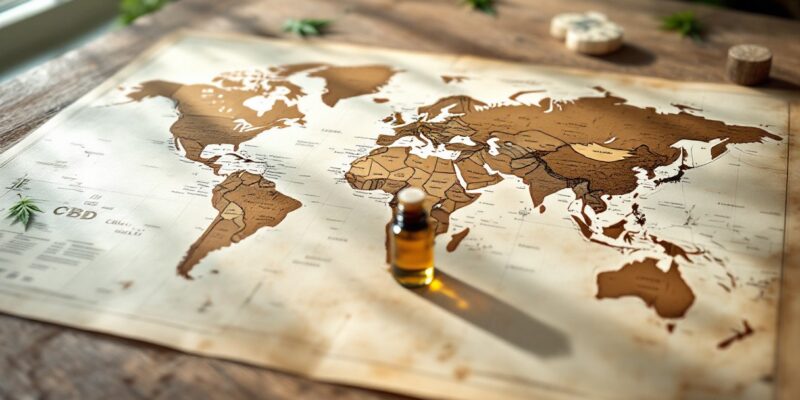Cannabidiol, commonly referred to as CBD, has gained significant popularity worldwide due to its potential health benefits and therapeutic properties. Despite this growing acceptance, the legal status of CBD varies widely across different regions. This divergence in legality poses challenges for both consumers and businesses. Understanding CBD’s legal classification within various jurisdictions is crucial for anyone involved in its consumption or distribution.
Some basics about CBD
CBD is one of the many cannabinoids found in cannabis plants and is notably recognized for lacking the psychoactive effects associated with tetrahydrocannabinol (THC). Due to this distinction, CBD products are often marketed for their purported health benefits without the “high” connected to THC.
Various products, such as oils, edibles, topicals, and vapes incorporate CBD. However, despite its known advantages, legal issues typically arise because of differences in national cannabis laws, including allowed THC content in products. Recognizing how international law approaches CBD can shed light on this complex scenario.
The role of THC content
An essential factor in determining CBD legality is the presence and concentration of THC. Most countries regulate CBD based on specific limits regarding THC content. When THC levels exceed these thresholds, such products might face restrictions akin to those imposed on cannabis.
For instance, many European nations set an upper limit of 0.2% THC for CBD products, while others like Canada might permit up to 0.3%. These variations highlight the importance of understanding local regulations before producing or consuming CBD.
CBD legality by region
North America
In North America, the CBD legality landscape is multifaceted. The United States, for example, federally legalized the production of hemp-derived CBD through the Farm Bill of 2018. Nevertheless, individual states enact diverse restrictions or allowances that complicate the legal framework.
Similarly, Canada fully embraced the legalization of cannabis, inclusive of CBD, in 2018. Yet, each province can impose unique rules governing sales and distribution, making it necessary for businesses to maintain updated knowledge of shifting legislation.
Europe
Over in Europe, the legal regulations on CBD differ significantly across nations. Countries like Germany and the UK have sanctioned CBD provided it contains minimal THC, adhering to regional standards. Meanwhile, some Eastern European territories, challenged by cultural conservatisms, tend towards stricter policies.
The European Union encompasses largely harmonized norms regarding cannabinoid percentages yet leaves implementation to member states. Such autonomy leads to divergences in execution, stifling attempts to establish a cohesive market strategy for CBD enterprises.
Asia-Pacific
The Asia-Pacific region illustrates contradictory positions regarding CBD. In Japan, CBD sans THC encounters little opposition legally, aligning well with traditional wellness practices to amplify acceptance rates. Conversely, Southeast Asian nations adopt progressive to outright prohibitory laws.
Furthermore, Australian laws surrounding CBD lean towards permitting medical use. Recent amendments legalized low-dose, over-the-counter Australian CBD oil pending approval by regulatory authorities. This shift enjoys backing from public sentiments favoring integrative healthcare solutions.
Africa and the Middle East
A struggle against historical taboos predominates in Africa alongside burgeoning interest in CBD. Regions like South Africa decreed CBD allowances under particular conditions, balancing social perceptions with economic pursuits tied to cannabis industries.
The Middle East largely regards CBD suspiciously, echoing overarching bans accompanying wide-reaching control measures on all cannabis derivatives. Israel remains relatively open, positioning itself as a research leader in medical applications concerning cannabinoids.
International law and cannabis laws
Navigating international law presents additional complexities when evaluating CBD legality. Various treaties, such as those spearheaded by the United Nations, influence global trends in drug policy. Although not explicitly addressing CBD, they affect broader cannabis classifications, perpetuating ambiguities for stakeholders.
This influence surfaces in conventions advocating strict prohibitions on narcotics yet allowing conditional exemptions where justified clinically. While reforms gain traction, genuine synchronization among international communities lags, requiring astute maneuvering to remain compliant with evolving norms.
Medical claims about CBD
Legislative perspectives frequently hinge upon medical claims about CBD’s efficacy. Countries sanctioning medical marijuana routinely support scientific inquiries aimed at substantiating therapeutic assertions. Skepticism prevails; however, rigorous evaluations facilitate progressive debates inside governing bodies contemplating reform.
Accurate documentation of benefits attributed to CBD exists sparingly but grows alongside expanding clinical trials conducted globally. Jurisdictions prioritizing balanced discourses create favorable environments nurturing innovations within non-intoxicating cannabinoid sectors.
CBD product legality challenges
Marketing expenditures underscore efforts to capitalize on CBD’s escalating demand. Nonetheless, surpassing regulatory hurdles entails familiarizing oneself with distinctly territorial frameworks established internationally. Unintentionally transgressing commitments exposes businesses to liabilities threatening operational integrity.
Challenges compound especially during transit between regions practicing dissimilar enforcement paradigms. Incidences involving confiscations perplex travelers bearing legally procured CBD products inadvertently deemed contraband elsewhere. Such occurrences underline demands addressing coherency lapses, creating confusion spanning global supply chains.
Traveling with CBD
Venturing abroad while carrying commercially available CBD products increasingly attracts travelers’ attention. Authorities stress consulting embassies prior to excursions delineating precise stipulations applicable post-arrival. Documentation verifying product composition further mitigates inconveniences experienced amid uninformed boundary crossings.
Vigilance ensures ongoing conformity maintaining reputational goodwill fostering trust uniquely given the nuanced backdrop defining global logistic networks managing cross-border exchanges associated directly with contemporary wellness culture merging spiritual aspirations and physiological transformations via natural remedies.
Australia
Australia represents a fascinating case study in the journey toward broadening cognitive receptivity concerning emerging therapeutics derived organically—especially cannabidiol. Emphasizing rigor, Australian regulators demanded concerted oversight commensurate with emerging anecdotal endorsements enhancing resilience against long-standing skepticism harbored nationally reflecting historic relations involving illicit cannabis cultivation operations prosecuted stringently initially.
Nonetheless, initiatives pioneered linking regulatory domains encouraged convergence stimulating adoption reflective attitudes promoting communal welfare parallel consistent accuracies disseminated catalyzing progressive departures focusing avenues aligned genuinely expressing authentic uplifting lifestyles embracing centuries-old healing traditions synergizing contemporary adaptive insights amplifying holistic understandings promising hopeful generations valuing aging gracefully.












Comments